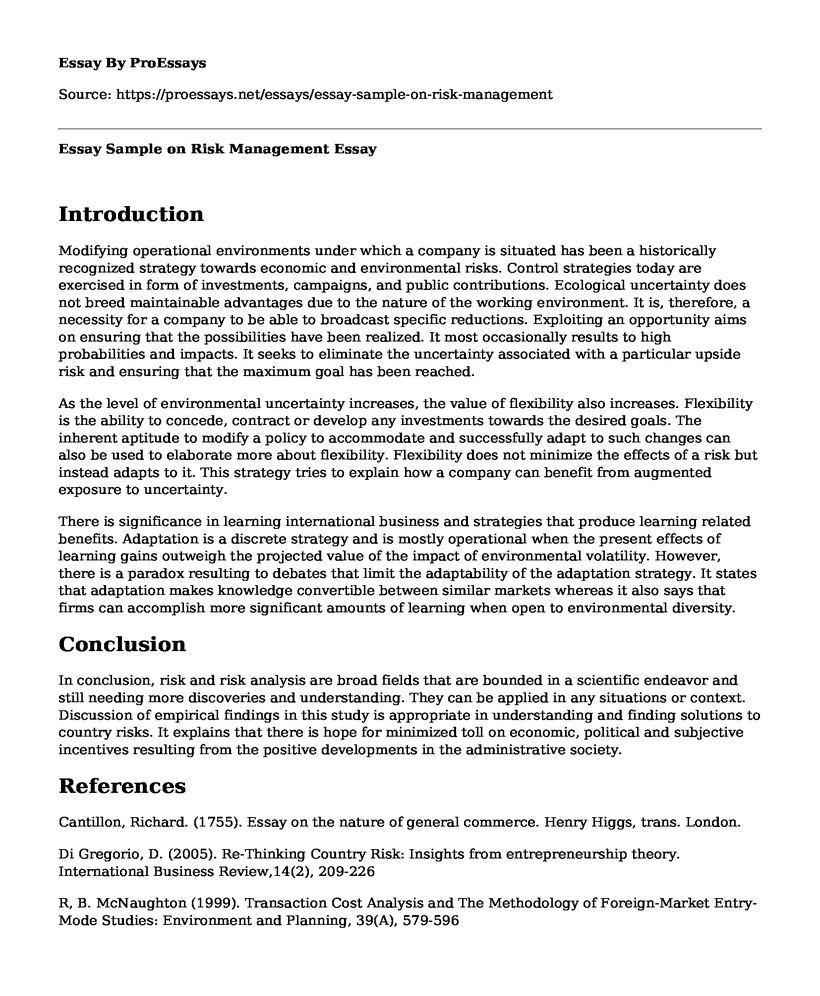Introduction
Modifying operational environments under which a company is situated has been a historically recognized strategy towards economic and environmental risks. Control strategies today are exercised in form of investments, campaigns, and public contributions. Ecological uncertainty does not breed maintainable advantages due to the nature of the working environment. It is, therefore, a necessity for a company to be able to broadcast specific reductions. Exploiting an opportunity aims on ensuring that the possibilities have been realized. It most occasionally results to high probabilities and impacts. It seeks to eliminate the uncertainty associated with a particular upside risk and ensuring that the maximum goal has been reached.
As the level of environmental uncertainty increases, the value of flexibility also increases. Flexibility is the ability to concede, contract or develop any investments towards the desired goals. The inherent aptitude to modify a policy to accommodate and successfully adapt to such changes can also be used to elaborate more about flexibility. Flexibility does not minimize the effects of a risk but instead adapts to it. This strategy tries to explain how a company can benefit from augmented exposure to uncertainty.
There is significance in learning international business and strategies that produce learning related benefits. Adaptation is a discrete strategy and is mostly operational when the present effects of learning gains outweigh the projected value of the impact of environmental volatility. However, there is a paradox resulting to debates that limit the adaptability of the adaptation strategy. It states that adaptation makes knowledge convertible between similar markets whereas it also says that firms can accomplish more significant amounts of learning when open to environmental diversity.
Conclusion
In conclusion, risk and risk analysis are broad fields that are bounded in a scientific endeavor and still needing more discoveries and understanding. They can be applied in any situations or context. Discussion of empirical findings in this study is appropriate in understanding and finding solutions to country risks. It explains that there is hope for minimized toll on economic, political and subjective incentives resulting from the positive developments in the administrative society.
References
Cantillon, Richard. (1755). Essay on the nature of general commerce. Henry Higgs, trans. London.
Di Gregorio, D. (2005). Re-Thinking Country Risk: Insights from entrepreneurship theory. International Business Review,14(2), 209-226
R, B. McNaughton (1999). Transaction Cost Analysis and The Methodology of Foreign-Market Entry-Mode Studies: Environment and Planning, 39(A), 579-596
Cite this page
Essay Sample on Risk Management. (2022, Jun 26). Retrieved from https://proessays.net/essays/essay-sample-on-risk-management
If you are the original author of this essay and no longer wish to have it published on the ProEssays website, please click below to request its removal:
- A Case Study of Engstrom Auto Mirror Plant
- Paper Example on Servant Leadership at Conservation International (CI)
- Information Security Management Paper Example
- Assessment Current Organizational Demographics: Nike Company
- Emotional Intelligence and The Influence on Leadership Decision-Making Paper Example
- Paper Example on Red Bull GmbH: Birth of a New Category of Energy Drinks
- Paper Sample on Maximizing Shareholders Wealth: The Benefits of a Good Capital Structure and Financing Strategy







